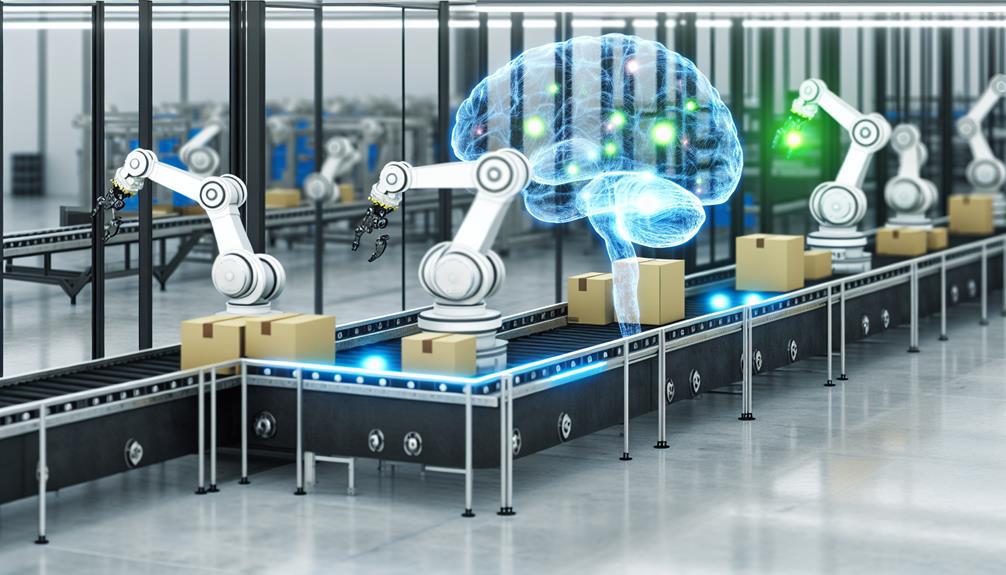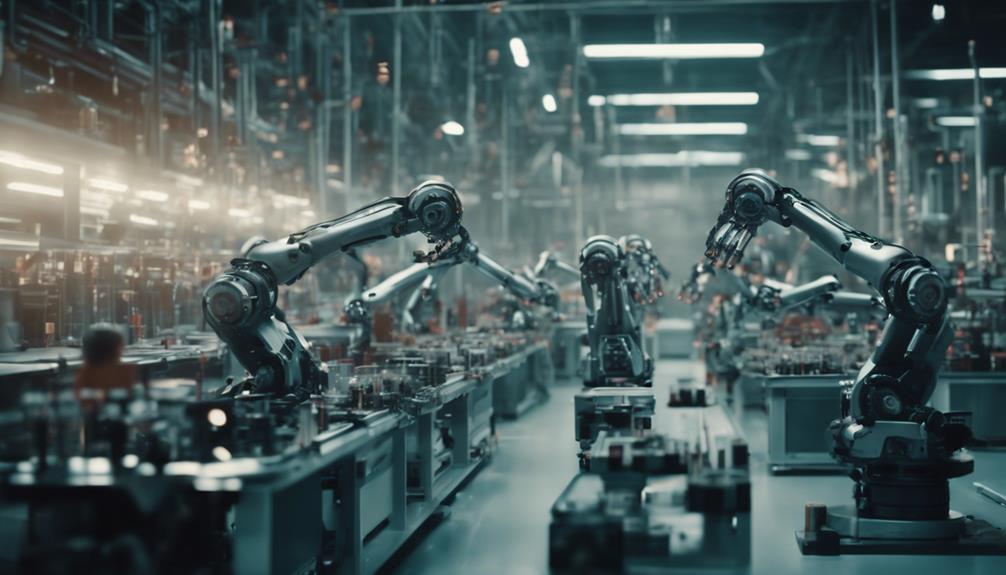Think about all the things you do daily to keep your business running smoothly. From managing tasks to streamlining processes and reducing mistakes, it’s a lot to handle.
That’s where AI workflow automation comes in. This technology isn’t just about replacing people, but about giving your team the chance to concentrate on more important tasks that add real value to your business.
Curious about how this is changing the way we do business? Let’s chat a bit more about it.
Key Takeaways
- Task Management: AI workflow automation assists in managing numerous daily business tasks efficiently.
- Procedure Refinement: It aids in refining business procedures, ensuring smoother operations.
- Error Minimization: Utilizes technology to reduce errors, enhancing overall business performance.
- Workforce Augmentation: AI is designed to complement, not replace, your workforce by automating routine tasks.
- Focus on Growth: Enables team members to concentrate on strategic tasks that drive business growth.
- Innovation in Business: AI workflow automation represents a significant innovation, transforming how businesses operate.
- Reshaping Business Landscape: This technology is pivotal in reshaping the approach towards business management and growth.
What is AI workflow Automation?

You know that feeling when you’re neck-deep in tasks, and you wish you could clone yourself to get everything done? That’s where AI workflow automation comes in. It’s like having an extra set of hands, but these hands are powered by artificial intelligence.
So, what’s the big deal about AI workflow automation? Well, imagine those routine tasks that keep cropping up in your day-to-day work. Things like data entry or analysis. Instead of having your team spend hours on them, you could have an AI system do it faster, more accurately, and without needing a coffee break.
And that’s not all. These AI systems are smart. They observe, learn, and adapt. They can make decisions based on the data they’re working with. It’s like having a super-efficient, non-stop working teammate.
The benefits? Well, for starters, it’s a huge time-saver. But it’s not just about time. It’s also about quality. Because let’s face it, humans make mistakes. But with an AI system, you minimize those errors. You get precision and efficiency.
And let’s not forget about cost savings. When you automate tasks, you’re making better use of your resources. You’re avoiding those silly but costly mistakes. And you’re freeing up your team to focus on more strategic, value-adding tasks.
Why is AI workflow automation important?
Let’s chat about how important it is to have automated workflows in our businesses today. This new tech wave is all about making things simpler and more efficient, and who doesn’t love that?
Think about all those tedious tasks your team does every day. Wouldn’t it be great if a tool could handle these for you? That’s exactly what these nifty automation tools do. They take care of the repetitive stuff, so your team can focus on the bigger picture.
Now, imagine doing your data work or customer service tasks. Sounds boring, right? But with automation tools, these tasks can be done quicker and with fewer mistakes. It’s like having an extra pair of hands that never gets tired or makes a mistake. Talk about a win-win!
One of the great things about automated workflows is they’re like your own personal quality control. They keep things consistent, ensuring every process is done the same way, every time. This means you can be confident about the quality of your work, no matter what.
And let’s not forget about adaptability. We all know how quickly things can change in business. But with automated workflows, you can adjust to these changes without breaking a sweat. Whether it’s a new customer request or a shift in the market, your business can bob and weave with the best of them. So, let’s embrace this wave of automation and see how it can help our businesses thrive.
Who are benefits from AI workflow automation?

Ever thought about who in your business could really get a boost from AI workflow automation? Well, let’s chat about that.
Primarily, your sales and marketing folks are in for a treat. Automation can make their work smoother and boost their productivity. But hey, they’re not the only ones!
Having better data analytics and getting things to market quicker are huge perks that your whole business can enjoy.
1. Sales teams
Here’s the thing, your sales team can gain a lot from using automated workflows. Why? Well, it takes care of those time-consuming tasks like data entry and scheduling, freeing up your team to focus on the good stuff – building relationships and closing deals.
Let’s break it down:
- Informed Choices: With real-time insights and analytics, your team can make decisions based on solid data for better sales strategies.
- Tailored Customer Experiences: Understanding customer preferences becomes a breeze, making it easier to offer bespoke solutions that keep your customers happy.
- Boosted Efficiency: With automation taking care of the small stuff, you’ll notice fewer errors and a quicker sales cycle, improving your overall efficiency.
- Increased Revenue: Faster processes and a focus on the best leads can lead to more revenue. So, why not give automated workflows a try and see your sales fly high?
2. Marketing teams
Imagine this: your marketing team no longer has to spend hours on mundane tasks. Instead, they’re able to focus their energy on designing creative campaigns and strategic activities. Sounds good, doesn’t it?
Well, that’s exactly what workflow automation can do. It’s like having an invisible helper, taking care of all those repetitive tasks that eat up your team’s valuable time.
But that’s not the only perk. Workflow automation also cuts down on manual errors, making the entire process smoother and more efficient. The result? A boost in productivity and a better handle on managing campaigns.
And there’s more! With the help of predictive analytics, your team can pinpoint the right audiences and tailor strategies to fulfill their needs. Think of it as having a crystal ball that tells you exactly what your customers want.
3. Better Data Analytics
Think about how every team in your business could reap the benefits of smarter, automated workflows, especially when it comes to crunching numbers and analyzing data. By automating your workflow with AI, you’re setting up a system that’s not just more efficient, but also less likely to stumble on human error.
- Sharper Data Analysis: Imagine having the power to swiftly sift through large, complicated data sets. AI gives you that capability, providing insights that guide your data-driven choices.
- Future Forecasting: By picking up on patterns and trends, AI can give you a glimpse into the future, assisting in crafting more effective plans.
- Spotting the Odd One Out: AI has the knack for spotting the unusual in your data – those deviations or outliers that could signal a problem needing your urgent attention.
- Gaining an Edge: With AI powering your data analytics, you’re setting your business up for success. You’ll find insights and trends that might be overlooked by others.
4. Improved Time-to-Market
Taking advantage of AI for data examination doesn’t just help you better comprehend your business operations, but it also significantly reduces the time your products and services take to reach the market. Think of AI workflow automation as a major player in refining and enhancing your current business operations.
The level of effectiveness it introduces lets you digitalize many tasks, saving you precious time for planning and innovating. This surge in effectiveness results in your products and services reaching the market much faster, giving your business an edge over others.
The influence of AI workflow automation alters how you manage your business, encouraging agility and responsiveness to market shifts. Adopting AI workflow automation doesn’t just boost productivity, it also helps you position your business for success in a world that’s becoming more and more digital by the day.
Key Components of AI Workflows
If you’re looking to improve your business operations, getting a grip on the basic elements of AI workflows is a must.
So, what does this involve? Well, there are three main parts – inputting data, crunching that data with algorithms, and then creating an output.
Get familiar with these, and you’ll be well on your way to making the most of your business’s AI capabilities.
No need for any tech jargon or fancy words, just simple, straightforward steps to make your business run smoothly and efficiently.
1. Data Input
Let’s talk about the magic that happens behind the scenes of your business’s AI operations. It all starts with taking in data – think of it as the nourishment your AI needs to thrive. We’re talking about collecting, sprucing up, and reformatting both structured and unstructured data from a variety of sources. This process is the backbone of automating your AI workflows and eventually, it’s what fuels your decision-making systems.
Step one, Data Collection: Think of this as a treasure hunt, where the prize is insightful data. It’s all about rounding up data from multiple corners – be it customer data, transactional data, or even external market data.
Next up, Data Cleansing: Here’s where we put on our cleaning gloves and scrub off any inaccuracies, inconsistencies, or duplicates from the data we’ve gathered. It’s like spring cleaning but for data.
Then comes Data Transformation: If your AI system spoke a language, this would be the translation stage. We take both structured and unstructured data and translate it into a language your AI system can comprehend and process.
Lastly, Integration: This is where the transformed data gets a warm welcome into your existing systems, ensuring everything runs as smoothly as silk.
And there you have it – the four-stage process that keeps your AI workflows spinning like a well-oiled machine!
2. Processing Algorithms
Let’s imagine this: You’ve gathered your data, tidied it up, given it a new look, and merged it all together. Now what? Well, this is where processing algorithms step onto the stage, taking on the role of the brainpower behind your AI operations. They’re kind of a big deal.
These smart codes—like machine learning, natural language processing, and deep learning tactics—are the magic behind how data is transformed and decisions are made. They sift through piles of data, apply tried-and-true rules, and deliver the results you want, automating your workflow in the process.
Here’s the really cool part: these algorithms can learn and adapt based on the data they receive. Over time, they get better and better at what they do, making smarter decisions and improving their performance. So, the quality of your AI operations largely depends on how well these algorithms are designed and put into action.
In short, processing algorithms are crucial in making your business operations smoother and more efficient through AI workflows. They’re the unsung heroes of the AI world, and they deserve a little recognition, don’t you think?
3. Output Generation
Alright, let’s chat about the final key aspect of AI workflows – the part where we generate outputs. In this stage, we use automation, AI, and analytical tools to produce results based on the data we’ve collected.
- Flexible: The process of generating outputs is flexible, built to handle diverse types of data and tasks. Whether it’s a small data set or a large one, this process can manage it all efficiently.
- User-Friendly: AI workflows are designed to be user-friendly for people who may not have a technical background. They allow you to be part of refining the processes, even if you don’t have a lot of technical know-how.
- Streamlining Processes: We use models that learn continuously for spotting irregularities and optimizing processes. This helps to make the overall workflow run more smoothly.
- Plus Points: The process of generating outputs helps businesses run more efficiently by simplifying tasks, aiding in better decision-making, and improving how resources are used. This is key to helping businesses evolve.
Types of AI workflow Automation
When it comes to AI workflow automation in the business landscape, there are a few key varieties to get your head around.
Two big ones that you’re likely to come across are cognitive automation and rules-based automation.
Both of these offer their own unique perks and impacts on how your business operates.
1. Types of AI workflow automation
Let’s chat about the ways AI can help automate your business workflows. There are primarily four kinds:
- Robotic Process Automation (RPA): Imagine a virtual helper that takes care of all the repetitive tasks in your business. That’s exactly what RPA does – it handles the mundane so your team can focus on the big stuff.
- Intelligent Automation: This is like RPA but with an extra kick. It combines RPA and AI to make your business processes smoother and more efficient.
- Cognitive Automation: Think of this as your smart assistant that learns and grows with you. It makes smart decisions based on the data it processes, getting smarter every day.
- Machine Learning-driven Automation: This kind uses algorithms to analyze data and automate tasks. The best part? No specific programming required.
Each of these has its own strengths and can serve different purposes in your business. By incorporating these technologies, your business processes can become more efficient, helping you keep up with the pace of the modern business world.
2. Cognitive automation
Think of cognitive automation like having a really smart assistant for your business. This advanced method uses the brilliance of AI to mimic the way humans learn, solve problems, and make decisions. It’s like having a team of professionals who understand natural language, are quick learners, and have excellent problem-solving skills.
What’s even more amazing? This smart assistant can handle unstructured data and adapt to ever-changing scenarios. It can even make independent decisions based on data. The outcome is a more efficient operation, happier customers, and innovative business methods.
In simple terms, cognitive automation is taking those old, tired workflows and making them smarter, more flexible, and more efficient. It’s like taking your business operations from a horse-drawn carriage to a sleek, modern sports car. So, why not give your business the upgrade it deserves? Try cognitive automation and see the difference for yourself.
3. Rules-based automation
Hey, let’s chat about something known as rules-based automation. With this neat little tool, your business can handle a whole lot of tasks with less manual effort. Think about it, wouldn’t it be great to have some of those repetitive tasks taken off your plate? Well, that’s exactly what this does!
The benefits of rules-based automation are many. For starters, it takes away those repetitive tasks that can be a real time drain. That means you and your team can focus on more important things, like strategizing for the future.
It’s also a real time-saver, helping to streamline your operations. Just imagine all the extra time you’ll have when tasks get completed faster and with more precision.
Now, let’s talk about efficiency. Consistency is key in any business, and this form of automation ensures that tasks are done accurately every time. No more worrying about mistakes or inconsistencies!
And lastly, the structured processes that come with rules-based automation can really help to reduce errors. That’s because everything follows a set of clear guidelines, so there’s less room for things to go wrong.
Conclusion
Desku.io presents a cutting-edge Generative AI solution, including DeskuGPT for Enterprises, designed to revolutionize your SaaS company’s approach to automation across customer support, IT, sales, operations, and HR processes.
Explore our AI-powered product suite, featuring AI Service Desk, AI Customer Service, AI Support Intelligence, AI Customer Intelligence, AI Contact Center, and AIOps. We’re here to provide you with an in-depth understanding of our AI offerings.
Curious about how Desku.io can enhance your customer interaction through automation? Our platform leverages advanced chatbot technology to streamline communications, ensuring efficient and effective customer service.
Reach out to discover more about Desku.io, request a free demo, or pose any questions you might have. Learn how our Generative AI solutions can empower your SaaS business with seamless chat automation capabilities.
Frequently Asked Question
How do you automate workflows in AI?
By using scripting and automation tools, you can automate workflows in AI.
What are the 4 stages of an AI workflow?
Data collection, Data preprocessing, Model training, Model deployment.
Can AI be used for automation?
Yes, AI can be used for automation.













